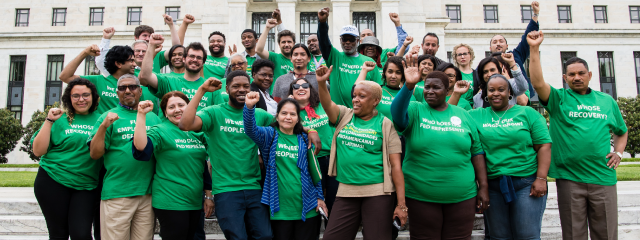Katrina X Reflections

By Katrina Gamble, Director of Civic Engagement and Politics
In this country being Black and poor means living in constant struggle. The commodification and dehumanization of Black bodies is rooted in the history of this country—from the blood-stained red clay of Southern slavery to wealth built from cheap cotton and textile manufacturing in the North.
Ten years ago when Hurricane Katrina hit the Gulf Coast and flooded the city of New Orleans the consequences of a long history of institutionalized racism were on full display. More than 1,800 lives were lost and tens of thousands of people were displaced.
As the flood waters rose and we saw grandmothers, mothers with babies, and, indeed, whole families left abandoned on their rooftops or out in the sweltering Gulf Coast heat – it shocked the country. Perhaps, because many had been lulled into the belief that the civil rights movement and the growing Black middle-class meant we’d somehow escaped the murderous grasp of racism and white supremacy in the United States.
But there it was exposed – a wound that never quite healed. Black people in a beloved city were abandoned and made a public spectacle for the world to see. To make matters worse, when Black people went looking for protection and shelter, they were called refugees in their own country. And instead of being rescued, they were met with a militarized occupation.
When you think of natural disasters you think of something unpredictable, but mitigated by some semblance of comfort that emergency evacuation plans, government regulations, and investments in infrastructure are supposed to provide.
Most of us did not know that the levees would break and that New Orleans and other cities across the Gulf Coast would be submerged. But for those of us who have grown up Black and poor in America, living precariously close to disaster is a daily lived experience. So, as Katrina barreled down on New Orleans ten years ago, we certainly could have predicted the impact on the poor Black communities of New Orleans.
In a city where forty percent of Black families lived below the poverty line, and wherenearly 60 percent of those families did not have access to a car, the impact of a storm like Hurricane Katrina was dismayingly predictable for the thousands of Black families living in poverty or at the edge poverty.
Speculators and corporate profiteers stood waiting to take advantage of this moment resulting in both the economic and the physical displacement of many Black residents. From corporate take-over of the school district to destruction of public housing the tradition of profiting off of black trauma continues in New Orleans. Katrina Truth, a website developed by Advancement Project and Families and Friends of Louisiana’s Incarcerated Children, describes the racial divide in the post-Katrina recovery. Gentrification spurred the removal of public housing down to 2,006 units compared to 12,270 prior to Katrina. Today, nearly 40 percent of residents spend more than half of their income on housing.
As we reflect on the anniversary of Hurricane Katrina, we should focus less on the recovery and more on how we create strong and healthy communities grounded by the voices of the most vulnerable. If we could dream of the communities we want for ourselves and our families what would it look like? My dream would include equitable public community schools responsive to parents, students, and teachers -- not one where Black and brown children are put funneled into the school-to-prison pipeline. My dream would mean safe and quality housing for all rather than families displaced and pushed out of their communities by gentrification spurred on by corporate greed. It would mean all families being able to live with dignity and economic security rather than one where nearly 40 percent of children live in poverty. It would mean full employment, fair wages, and fair scheduling for working families rather than the continued exploitation of Black labor.
While these dreams are not yet realized, we continue to resist. And, in doing so, we stand with Gulf Coast Rising and others in New Orleans and the Gulf Coast who continue to fight for equitable and sustainable communities.
As you stand in resistance, what is your dream for your community?











